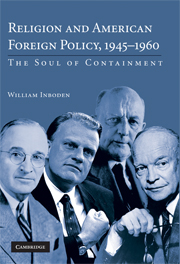Book contents
- Frontmatter
- Contents
- Preface and Acknowledgments
- Introduction
- PART ONE
- PART TWO
- 3 The “Real” Truman Doctrine: Harry Truman's Theology of Containment
- 4 To Save China: Protestant Missionaries and Sino–American Relations
- 5 Guided by God: The Unusual Decision-Making of Senator H. Alexander Smith
- 6 Chosen by God: John Foster Dulles and America
- 7 Prophet, Priest, and President: Dwight D. Eisenhower and the New American Faith
- Afterword
- Bibliography
- Index
- References
3 - The “Real” Truman Doctrine: Harry Truman's Theology of Containment
Published online by Cambridge University Press: 31 July 2009
- Frontmatter
- Contents
- Preface and Acknowledgments
- Introduction
- PART ONE
- PART TWO
- 3 The “Real” Truman Doctrine: Harry Truman's Theology of Containment
- 4 To Save China: Protestant Missionaries and Sino–American Relations
- 5 Guided by God: The Unusual Decision-Making of Senator H. Alexander Smith
- 6 Chosen by God: John Foster Dulles and America
- 7 Prophet, Priest, and President: Dwight D. Eisenhower and the New American Faith
- Afterword
- Bibliography
- Index
- References
Summary
Prophets, and presidents, are often unlikely people from unexpected places. Out of a humble Midwestern town, educated only through high school, emerged the Baptist president who defined God's purpose for America in the post-war world. Harry S. Truman, the unassuming Missourian who found himself thrust suddenly into the White House and onto the stage of history, took office just as his nation emerged from one world crisis only to face another. Yet Dean Acheson's “captain with a mighty heart” willingly embraced the monumental task he believed God and history had ordained for him.
Truman's accession to the presidency may have been more by accident than by design, but he believed nothing of the sort about America. He proclaimed in a 1948 speech the conviction he often echoed during his public life. “We are faced now with what Almighty God intended us to be faced with in 1920. We are faced with the leadership of the free peoples of the world. We must assume that leadership, if we expect our children not to have to go through the same situation that we had to go through with during the last five or six years. Get these things in your mind, and use your influence to do what God Almighty intended us to do: to get the right sort of peace in the world.”
- Type
- Chapter
- Information
- Religion and American Foreign Policy, 1945–1960The Soul of Containment, pp. 105 - 156Publisher: Cambridge University PressPrint publication year: 2008

